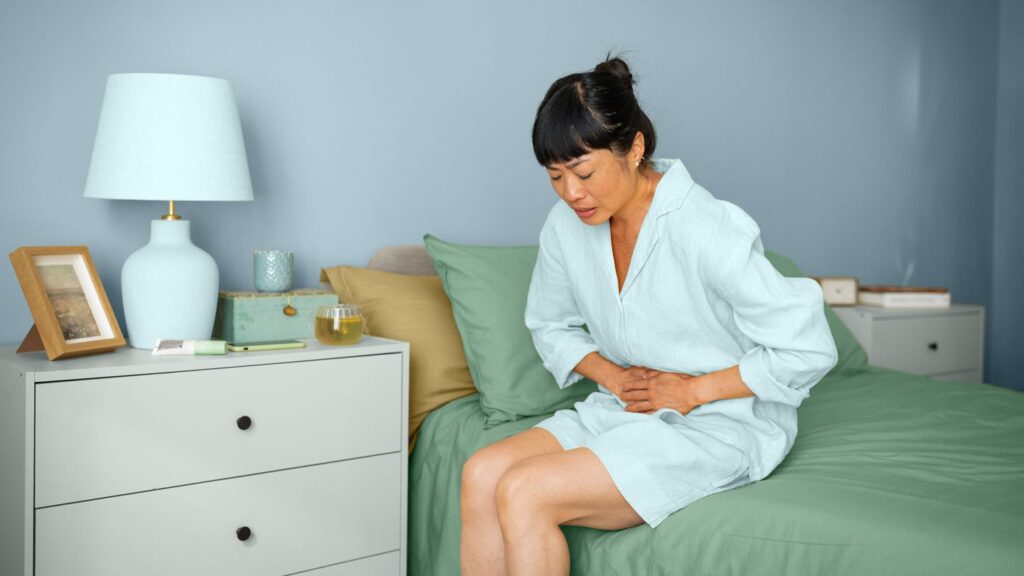Hormones like estrogen may help with gastrointestinal (GI) inflammation and the gut microbiome, so their decline may prompt more severe Crohn’s symptoms.
[7]
[8]
“[But] studies on the relationship between menopause and inflammatory bowel disease (IBD) have shown mixed, inconclusive results,” says Adalberto Gonzalez, MD, a gastroenterologist with Cleveland Clinic in Florida.
[9]
“On the one hand, women with Crohn’s disease whose symptoms worsened with fluctuating estrogen levels during their menstrual cycles may find relief after menopause because of an overall decrease in estrogen levels,” says Dr. Gonzalez. On the other hand, decreased levels of estrogen and progesterone from menopause may cause GI symptoms similar to those of Crohn’s disease, he says.
Menopause and Crohn’s Symptoms May Overlap
“Menopause and Crohn’s disease may have overlapping gastrointestinal symptoms, such as abdominal bloating and pain, gas, nausea, indigestion, constipation, and diarrhea,” says Gonzalez.
[10]
[6]
While hot flashes and night sweats are hallmark menopausal symptoms, they can worsen fatigue and impact quality of life for someone with Crohn’s. “Conversely, Crohn’s-related inflammation, pain, or malabsorption can exacerbate mood swings, bone loss, and vaginal dryness commonly seen in menopause,” says Gupta.
Menopause May Start Earlier With Crohn’s Disease
Limited evidence suggests Crohn’s disease may cause menopause to start at an earlier age, says Gonzalez. One small study of 171 women found that participants with an IBD like Crohn’s started menopause an average of a year and a half earlier than those without an IBD.
[2]
Both Crohn’s and Menopause May Affect Mental Health
Both Crohn’s and menopause can cause mood changes. Mental health support is vital, as both Crohn’s and menopause are associated with increased anxiety and depression, says Gupta.
[11]
“In general, menopause affects the general psyche of a woman, and can directly impact the brain-gut axis,” says Gupta.
[12]
Crohn’s and Menopause May Both Increase Osteoporosis Risk
Crohn’s can often lead to malnutrition, which, over time, can lead to low bone density from lack of dietary calcium. In addition, people who’ve had to take the steroid prednisone for Crohn’s flares have an increased risk for osteoporosis.
[13]
Similarly, menopause can make bones weaker, and women who have gone through this transition are at a higher risk for osteoporosis, with or without an IBD.
[4]
Hormone Replacement Therapy Shows Some Promise, but May Have Risks
Typically used to treat falling hormone levels during menopause, hormone replacement therapy (HRT) may have some therapeutic uses for women experiencing this transition alongside Crohn’s. One small study of 37 people with Crohn’s who used HRT postmenopause noticed an improvement in their IBD symptoms.
[7]
“[But] a recent systematic review revealed that few studies have examined menopause or hormone replacement therapy (HRT) in relation to IBD,” says Gonzalez. “Some studies associated HRT with an increased risk of IBD, while others illustrated an improvement in IBD symptoms.”
[7]
Another study of 447 patients with IBD and breast and prostate cancer found HRT actually caused IBD flares.
[14]
But a larger study of more than 10,000 women suggests that HRT use postmenopause doesn’t increase IBD symptoms.
[15]
For some, it may be worth the risk. “Both Crohn’s disease and menopause can predispose women to osteoporosis and depression, and the use of HRT may help with treatment of these conditions,” says Gonzalez.
[16]
Gupta doesn’t recommend HRT for managing Crohn’s disease itself, but also doesn’t discourage its use for menopausal symptoms if needed. “I believe more research is needed, particularly prospective, well-controlled studies that account for disease phenotype, biologic use, and hormonal fluctuations over time,” she says. “Until then, individual risk-benefit discussions with shared decision-making are key when considering hormone therapy in women with Crohn’s.”
Individualized Management of Crohn’s and Menopause Is Critical
Experts emphasize the importance of individualized management for each person experiencing menopause with Crohn’s disease. “For example, a known HRT risk includes blood clots, and so it may be best to avoid HRT use in those with active Crohn’s disease or the use of Crohn’s medication associated with thromboembolism, such as tofacitinib,” says Gonzalez.
[17]
[18]
While core Crohn’s treatments typically don’t change with menopause, this hormonal shift should prompt some additional considerations. “[For example,] bone health monitoring is crucial, especially in patients currently on corticosteroids or with a remote history of corticosteroid use and a history of malabsorption,” says Gupta. “I often recommend DEXA scans (bone imaging) and ensure adequate calcium and vitamin D intake.”
Lifestyle Factors Can Help Both Menopausal and Crohn’s Symptoms
For both menopause and Crohn’s disease, lifestyle changes can reduce uncomfortable symptoms. “Clean eating and daily exercise are simple building blocks,” says Dr. Khokhar.
For improved symptoms of menopause and Crohn’s disease, try these healthy habits:
[19]
[20]
- Limit or avoid nonsteroidal anti-inflammatory drugs (NSAIDs) like ibuprofen.
- Try to exercise (a walk or jog) daily or most days of the week and do muscle-strengthening exercises at least twice a week.
[21]
- Maintain a healthy weight.
- Limit or avoid alcohol.
- If you smoke, stop. If you need help quitting, ask your doctor for recommendations.
“Some of these lifestyle changes may be more difficult to maintain during menopause,” says Gonzalez. “For example, decreased estrogen may lead to weight gain, which has been associated with worse outcomes in IBD.” Women with joint pain after menopause may be inclined to use NSAIDs for pain relief, which [may also be] associated with IBD flares, says Gonzales.
If you have difficulty with any of these habits, or need help finding a treatment plan and lifestyle that’s both realistic and effective, ask your healthcare provider for their recommendations.

